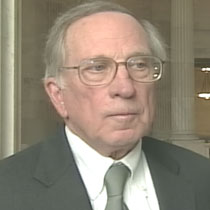-
(单词翻译:双击或拖选)
Washington
13 April 2007
Former U.S. Senator Sam Nunn has dedicated1 much of his career to reducing global threats from weapons of mass destruction. He is currently the co-chairman of the Nuclear Threat Initiative, a private group working to decrease such threats worldwide. In an interview with VOA, Nunn expressed concern that the risk of such an attack is growing, as we hear in this report from correspondent Meredith Buel in Washington.
More than 15 years ago, the U.S. Congress approved the Cooperative Threat Reduction Program. The legislation provides funding to the former Soviet2 states to dismantle3 their nuclear, biological and chemical weapons.
In the years since the program began, thousands of nuclear warheads have been dismantled4, and hundreds of intercontinental ballistic missiles have been destroyed.
 |
| Sam Nunn |
Despite those efforts, Nunn says, the risk of such weapons being used today is growing, not receding5.
He says more than 40 countries have enough highly enriched uranium to make a nuclear bomb.
The former senator says the rise of global terrorism and the availability of technology increase the likelihood of a nuclear attack.
"The ability now to discover or find out how to make a nuclear weapon and the knowledge that is proliferated6 to lots of individuals around the globe, that is a totally different thing than we faced 20-years ago," he said. "You combine all of that, and you have got a very dangerous situation."
Nunn says countries such as Iran and North Korea are, as he puts it, pushing international will to the brink7 by developing nuclear technology, and in the case of North Korea, producing nuclear weapons.
He says there are stockpiles of loosely guarded nuclear weapons-grade material scattered8 around the world, offering tempting9 targets for theft or sale.
"So the first step is to secure the material everywhere it is, wherever it is on the face of the earth," he said. "That takes cooperation of lots of different countries. As I view it, we are in a race between cooperation and catastrophe10, and, right now, the outcome is unclear."
Nunn says the potential for conflict among the major powers, most notably11 between the United States and Russia, has dramatically declined.
However, he says, nations with and without nuclear arms must embrace the vision of a world free of nuclear weapons.
"The United States is not going to give up our nuclear weapons without other countries giving them up, and that is the same for everybody that has nuclear weapons," said Nunn.
"But, if all of our countries that have nuclear weapons insist we are going to retain them forever, we are going to have a lot more company in that circle. That is a world I do not want to leave to my children and grandchildren," he continued.
Nunn says nations must redouble efforts to resolve regional conflicts, if the world is to reduce the incentive12 for acquiring nuclear weapons in places such as the Middle East, southwest Asia and the Korean peninsula.
He says potential regional confrontations13 create tensions that shape the security outlook for the entire world.
 收听单词发音
收听单词发音
1
dedicated

|
|
| adj.一心一意的;献身的;热诚的 | |
参考例句: |
|
|
|
2
Soviet

|
|
| adj.苏联的,苏维埃的;n.苏维埃 | |
参考例句: |
|
|
|
3
dismantle

|
|
| vt.拆开,拆卸;废除,取消 | |
参考例句: |
|
|
|
4
dismantled

|
|
| 拆开( dismantle的过去式和过去分词 ); 拆卸; 废除; 取消 | |
参考例句: |
|
|
|
5
receding

|
|
| v.逐渐远离( recede的现在分词 );向后倾斜;自原处后退或避开别人的注视;尤指问题 | |
参考例句: |
|
|
|
6
proliferated

|
|
| 激增( proliferate的过去式和过去分词 ); (迅速)繁殖; 增生; 扩散 | |
参考例句: |
|
|
|
7
brink

|
|
| n.(悬崖、河流等的)边缘,边沿 | |
参考例句: |
|
|
|
8
scattered

|
|
| adj.分散的,稀疏的;散步的;疏疏落落的 | |
参考例句: |
|
|
|
9
tempting

|
|
| a.诱人的, 吸引人的 | |
参考例句: |
|
|
|
10
catastrophe

|
|
| n.大灾难,大祸 | |
参考例句: |
|
|
|
11
notably

|
|
| adv.值得注意地,显著地,尤其地,特别地 | |
参考例句: |
|
|
|
12
incentive

|
|
| n.刺激;动力;鼓励;诱因;动机 | |
参考例句: |
|
|
|
13
confrontations

|
|
| n.对抗,对抗的事物( confrontation的名词复数 ) | |
参考例句: |
|
|
|















